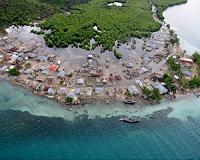 |
Port-Au-Prince (AFP) Nov 17, 2010 Haiti's cholera outbreak could kill 10,000 people, health officials warned Wednesday, amid fears the epidemic which has claimed hundreds of lives may spill beyond the country's borders. "Our projections show that we could have around 200,000 cases of infection in Haiti over the next six to 12 months," Pan-American Health Organization regional advisor Ciro Ugarte told AFP. "If the fatality rate (of four to five percent) is maintained... we may have 10,000 dead," said Ugarte, stressing that would be the worst case scenario. Isolated cholera cases have been found in the Dominican Republic -- it shares the Caribbean island of Hispaniola with Haiti -- and as far away as the southern US state of Florida, prompting local officials to take precautions. Haiti's health ministry said Wednesday that 1,100 people have now died since cholera was first detected in the nation in late October. The number of people hospitalized also grew to a total of 18,382. The cholera outbreak -- the first in half a century in the impoverished Caribbean nation -- is bringing new chaos to Haiti ravaged in a January quake, which killed 250,000 people and left 1.3 million homeless. And health officials fear the disease could spread like wildfire if it infiltrates Haiti's squalid refugee camps around the capital where hundreds of thousands of quake refugees live in cramped and unsanitary conditions. "The cholera epidemic cannot be stopped, especially in places where there is a lack of safe water supply, basic sanitation," Ugarte said. "The cholera could spread beyond Haiti, in the Dominican Republic and beyond." The disease has surfaced for the first time in the Dominican Republic, with one person who crossed over the border from Haiti being treated for vomiting and diarrhea. The Dominican Republic, a popular tourist destination, was in a "pre-epidemic phase," Health Minister Bautista Rojas Gomez said on local television. Dominican President Leonel Fernandez held an emergency meeting with his cabinet Wednesday to brainstorm on ways to combat the disease. Dominican officials worry fears of infection could have a devastating impact on their tourist industry, the country's main income generator. "This really is a serious danger," Santos Ramirez of the Dominican Medical Board warned. "Cholera could become a pandemic if it spreads on this side of the island. We must avoid a disaster of that scope." And Florida officials confirmed to AFP that a woman who recently visited relatives in Haiti had tested positive for cholera in the southern US state. Florida -- home to a large Haitian community of about 240,000 people who travel frequently to the nation -- is already on alert for any outbreak of the water-borne disease. There are claims the outbreak emanated from septic tanks at a base for Nepalese peacekeepers where some believe infected feces leaked into a tributary of the Artibonite River, used by locals for drinking and bathing. The rumors sparked violent protests this week against the UN troops, in which two Haitians were killed and 20 people injured, including six peacekeepers. The UN force, known as MINUSTAH, issued a statement linking the protests to presidential elections and calling on Haitians not to allow themselves to be manipulated by "the enemies of stability and democracy." The desperate situation has left public health experts with little option but to focus on the bottom line: trying to stop the rash of fatalities from the bacteria-based disease that travels mainly through contaminated water. "We felt that the best strategy with this outbreak was to focus on preventing death," said Jordan Tappero, who leads the CDC team on cholera response in Haiti. The CDC is rotating more than 350 staffers in and out of the country on 30-day assignments, as they try to train locals and health officials in the fight against the fast-spreading disease. Cholera "is a great hitchhiker. It travels by contaminated water, food or an individual who may be asymptomatic or developing symptoms," said Tappero. He added because of that it was virtually impossible to pinpoint the origins of the cholera outbreak in Haiti. MINUSTAH has said it has tested some of the Nepalese and found no trace of cholera, and health officials have said that although Haiti's cholera is a south Asian strain this is no smoking gun as the strain is very common.
Share This Article With Planet Earth
Related Links Epidemics on Earth - Bird Flu, HIV/AIDS, Ebola
 Cholera could kill 10,000 in Haiti in the next year: expert
Cholera could kill 10,000 in Haiti in the next year: expertWashington (AFP) Nov 17, 2010 The cholera epidemic in Haiti could kill 10,000 people and cause 200,000 infections in the coming year, a doctor with the Pan-American Health Organization said on Wednesday. "Our projections show that we could have around 200,000 cases of infection in Haiti over the next six to twelve months," PAHO regional advisor Ciro Ugarte told AFP. "If the fatality rate (of four to five percent) is ... read more |
|
| The content herein, unless otherwise known to be public domain, are Copyright 1995-2010 - SpaceDaily. AFP and UPI Wire Stories are copyright Agence France-Presse and United Press International. ESA Portal Reports are copyright European Space Agency. All NASA sourced material is public domain. Additional copyrights may apply in whole or part to other bona fide parties. Advertising does not imply endorsement,agreement or approval of any opinions, statements or information provided by SpaceDaily on any Web page published or hosted by SpaceDaily. Privacy Statement |